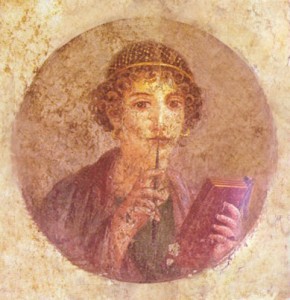Last week, we watched a movie called Agora. The film took place in the late 4th and early 5th centuries C.E., during a time of Roman decline, growing Christian power and a tragic loss of human knowledge.
Agora centers around the great Library at Alexandria, which was already several hundreds of years old by that time. The protagonist is Hypatia – daughter of one of the respected leaders of the university, and herself a successful mathematician, astronomer, philosopher and teacher.
Long and bloody story short, the Jews, Christians and Pagans living in Alexandria with Hyaptia did not get along. As religion so often does, it drew lines, created misconceptions and led to horrible fighting. The library and its scholars came to be seen as protectors of godless activity and witchcraft. Hyaptia especially was targeted as one of the last philosophers, a pagan and a woman. Without giving away the ending, I’ll just say that her treatment, and that of the library itself, at the hands of the Christians is ghastly.
Side note: I thought some of the cinematography was fabulous – shooting from heights and angles that made the people look like scurrying swarms of ants. Ah, metaphor.
Of course, Agora gives us one version of the possible means of destruction of the library. Some think it was Julius Caesar over 300 years before, or Moslem Caliph Omar more than 200 years later. Whatever the truth is, Hypatia the historical figure remains a symbol of what human learning and knowledge once were, and the devastation that closed minds and hatred can wreak upon them.
I didn’t know about Hypatia before seeing the film, but my husband was aware through the monologues of Carl Sagan in his last episode of Cosmos. I watched that episode, and was further annoyed by how often this sort of thing still takes place. None of us like to be “taught” by people and groups we don’t agree with on a base level. Liberals stick to liberal media, conservatives to conservative outlets. Many Christians don’t want their kids taught evolution in school, and atheists don’t want to see the Biblical commandments on government buildings. Each of these groups is entitled to its preferences, but it might not hurt to go out of the comfort zone now and then. See where the other side is coming from.
Really, between us, humans have a lot more similarities than differences. And unless his differences are truly harming her, she should simply accept them and go about her life.
Beyond that, if someone I don’t generally agree with is offering some fantastic knowledge, I should see the benefit of paying attention.
Happily, they’ve rebuilt the Library at Alexandria, the New Bibliotheca Alexandrina. I take it as a good sign, and a reminder to myself (who’s just as guilty as anyone else of wearing cultural blinders) that everything we do has a butterfly effect, albeit a blip on the screen, and that we better screw up as little as possible.
Source:
http://ehistory.osu.edu/world/articles/articleview.cfm?aid=9

